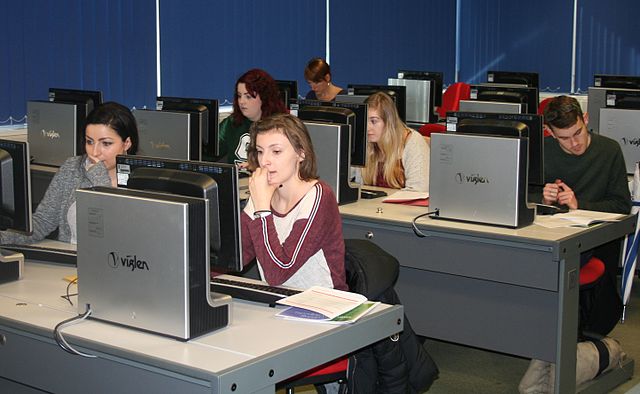
This post was written by Robin Owain, WMUK’s Wales Manager, and originally published on the Wikimedia Foundation’s blog
On 28 January 2015, Prof. Deborah Youngs and Dr Sparky Booker of Swansea University ran the first edit-a-thon at a university in Wales. The aim was to improve articles on women and reduce the gender gap on Wikipedia – by getting more women involved as editors and increasing coverage of medieval and early modern women on Wikipedia.
This Medieval Women Edit-a-thon was organized as part of “Women Negotiating the Boundaries of Justice”, a four-year research project on the history of women’s access to justice in Britain and Ireland between the twelfth and eighteenth centuries (led by Prof. Youngs and funded by the AHRC).
About 45 people attended and around 30 participated in editing. Participants included undergraduates, postgraduates, academic researchers and librarians from Swansee University — and workers from Paris. Three quarters were women, and only three had previously edited Wikipedia. A few spoke Welsh, and therefore, some of the jargon was in that language (being my mother tongue). We were also joined by researchers from Trinity College, Dublin, who were keen to update material on Irish women. Their focus was on Alice Kyteler and Petronilla de Meath, her servant, who were the first women to be tried for witchcraft in medieval Ireland. This inspired one of the editors in Swansea to write about Gwen daughter of Ellis, the first person to be executed on charges of witchcraft in Wales.
The online connection with Dublin was mainly through emails. Looking back, it would have been helpful to use video conferencing — for a more personal touch, which is so important when training editors. Independent researchers in the US were also interested in participating remotely. This is definitely something to consider for future events, as new technology can enable anyone, anywhere in the world to take part in training and discussions, as well as in the editing itself.
I have strong personal feelings about gender equality on Wikipedia (especially the English Wikipedia), where I think the number of female administrators should be at least half the total. In my opinion, this would help reduce the ‘bullying’ which happens so often. On the Welsh Wikipedia, the discussions hardly ever become over-heated; and three of our longest serving administrators happen to be women.
At my side were Jason Evans, the new Wikipedian in Residence at the National Library of Wales, and Marc Haynes, former Wikipedian in Residence at Coleg Cymraeg (the federal Welsh language university); they helped people with simple wiki code (Wiki markup), in both Welsh and English. After an hour or so of training, it was time to get down to the actual editing.
Our participating editors worked individually and in groups, on a variety of different articles featuring women from Wales and Ireland during c.1000–1600. Some editors worked on subjects of their own personal research and others suggested women we had identified before the edit-a-thon. We thought these women deserved their own new articles — or serious edits to the existing articles they were featured in. Many notable women only appear in the articles of their husbands, fathers, or other male family members; they deserve coverage in their own right.
During this Swansea edit-a-thon I tried something new: getting new editors to create links from their user page to the project page immediately! In the past, the actual wiki-coding was kept back – too long in my opinion. This worked well: they took to it like ducks to water and created other links – to my user page and to each other’s. As soon as they realized how simple it is, inhibitions evaporated!

Bringing people’s attention to weaknesses of Wikipedia is a good thing: drawing their attention to the fact so many notable women do not have articles on Wikipedia encourages a change. It would be interesting to have a room full of men who also wish to close this gap. An edit-a-thon of men who don’t see the injustice could be even better! Why do some men only write about military killing machines, ignoring the death and pain caused by them? For example, if women were to write the article on the 2011 military intervention in Libya, I’m sure it would also contain images of the civilian death and destruction caused by these machines. We need a change in minds and we need to take the ‘romance’ out of war. Maybe the next edit-a-thon shouldn’t focus on writing articles about women, but debunking the male, jingoistic attitude of many mainstream articles.
Jason Evans, Wikimedian in Residence at the National Library of Wales, recently announced an edit-a-thon to be held at the Library on April 10th. It will be based on Welsh photographers — including the Magnum photographer Philip Jones Griffiths, whose defining images captured the horrors of the Vietnam War. One of the two images uploaded by Jason (as an example of things to come) depicts a bandaged woman tagged as a ‘Vietnamese civilian’. I certainly hope that those who write about American bombers, tanks and other killing machines will also add such images to these articles.
Outcomes
Participants found the Medieval Women Edit-a-thon successful and enjoyable: in a single day, they created 6 new articles and edited 10 articles about notable Welsh, English and Irish medieval women. More importantly, they became comfortable with editing Wikipedia and plan to keep contributing.
Prof. Deborah Youngs noted that:
“The exercise of writing in this style, and making sure that our articles were written very clearly and simply in as factual a manner as possible, was a very enjoyable and we succeeded (we think!) in keeping our opinions out of it. Of course, even as we got used to encyclopaedic writing style, we also became accustomed to the very liberating thing about the Wikipedia format – that we can change the articles so easily as new information comes to light and as other editors in the community comment on it – and now that we have a core of enthusiastic editors, we know that while this was the first edit-a-thon in Swansea University, it won’t be the last.”
Three other direct outcomes include:
- 5,000 images of Egyptian artifacts held at Swansea University will be uploaded to Commons on a CC-BY-SA license.
- The university’s Athena Swan team voiced their interest in holding a similar edit-a-thon later this year, to increase the number of articles on women from all areas of life.
- Cardiff University has also requested a similar edit-a-thon.
The main aim of the Swansea edit-a-thon was to increase content based on women c.1000–1600; the outcome, however, was more about changing mindsets.







2 thoughts on “First Welsh university edit-a-thon creates new articles on medieval women”